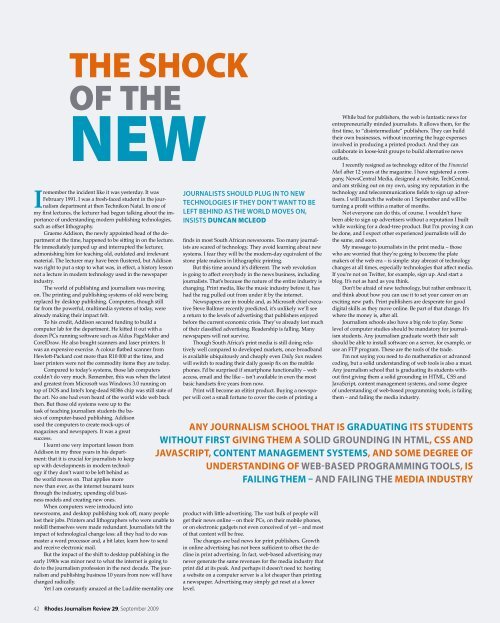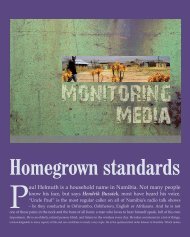Riding on the cup: - Rhodes Journalism Review - Rhodes University
Riding on the cup: - Rhodes Journalism Review - Rhodes University
Riding on the cup: - Rhodes Journalism Review - Rhodes University
Create successful ePaper yourself
Turn your PDF publications into a flip-book with our unique Google optimized e-Paper software.
The shock<br />
of The<br />
neW<br />
I<br />
remember <strong>the</strong> incident like it was yesterday. It was<br />
February 1991. I was a fresh-faced student in <strong>the</strong> journalism<br />
department at <strong>the</strong>n Technik<strong>on</strong> Natal. In <strong>on</strong>e of<br />
my first lectures, <strong>the</strong> lecturer had begun talking about <strong>the</strong> importance<br />
of understanding modern publishing technologies,<br />
such as offset lithography.<br />
Graeme Addis<strong>on</strong>, <strong>the</strong> newly appointed head of <strong>the</strong> department<br />
at <strong>the</strong> time, happened to be sitting in <strong>on</strong> <strong>the</strong> lecture.<br />
He immediately jumped up and interrupted <strong>the</strong> lecturer,<br />
adm<strong>on</strong>ishing him for teaching old, outdated and irrelevant<br />
material. The lecturer may have been flustered, but Addis<strong>on</strong><br />
was right to put a stop to what was, in effect, a history less<strong>on</strong><br />
not a lecture in modern technology used in <strong>the</strong> newspaper<br />
industry.<br />
The world of publishing and journalism was moving<br />
<strong>on</strong>. The printing and publishing systems of old were being<br />
replaced by desktop publishing. Computers, though still<br />
far from <strong>the</strong> powerful, multimedia systems of today, were<br />
already making <strong>the</strong>ir impact felt.<br />
To his credit, Addis<strong>on</strong> secured funding to build a<br />
computer lab for <strong>the</strong> department. He kitted it out with a<br />
dozen PCs running software such as Aldus PageMaker and<br />
CorelDraw. He also bought scanners and laser printers. It<br />
was an expensive exercise. A colour flatbed scanner from<br />
Hewlett-Packard cost more than R10 000 at <strong>the</strong> time, and<br />
laser printers were not <strong>the</strong> commodity items <strong>the</strong>y are today.<br />
Compared to today’s systems, those lab computers<br />
couldn’t do very much. Remember, this was when <strong>the</strong> latest<br />
and greatest from Microsoft was Windows 3.0 running <strong>on</strong><br />
top of DOS and Intel’s l<strong>on</strong>g-dead 80386 chip was still state of<br />
<strong>the</strong> art. No <strong>on</strong>e had even heard of <strong>the</strong> world wide web back<br />
<strong>the</strong>n. But those old systems were up to <strong>the</strong><br />
task of teaching journalism students <strong>the</strong> basics<br />
of computer-based publishing. Addis<strong>on</strong><br />
used <strong>the</strong> computers to create mock-ups of<br />
magazines and newspapers. It was a great<br />
success.<br />
I learnt <strong>on</strong>e very important less<strong>on</strong> from<br />
Addis<strong>on</strong> in my three years in his department:<br />
that it is crucial for journalists to keep<br />
up with developments in modern technology<br />
if <strong>the</strong>y d<strong>on</strong>’t want to be left behind as<br />
<strong>the</strong> world moves <strong>on</strong>. That applies more<br />
now than ever, as <strong>the</strong> internet tsunami tears<br />
through <strong>the</strong> industry, upending old business<br />
models and creating new <strong>on</strong>es.<br />
When computers were introduced into<br />
newsrooms, and desktop publishing took off, many people<br />
lost <strong>the</strong>ir jobs. Printers and lithographers who were unable to<br />
reskill <strong>the</strong>mselves were made redundant. Journalists felt <strong>the</strong><br />
impact of technological change less: all <strong>the</strong>y had to do was<br />
master a word processor and, a bit later, learn how to send<br />
and receive electr<strong>on</strong>ic mail.<br />
But <strong>the</strong> impact of <strong>the</strong> shift to desktop publishing in <strong>the</strong><br />
early 1990s was minor next to what <strong>the</strong> internet is going to<br />
do to <strong>the</strong> journalism professi<strong>on</strong> in <strong>the</strong> next decade. The journalism<br />
and publishing business 10 years from now will have<br />
changed radically.<br />
Yet I am c<strong>on</strong>stantly amazed at <strong>the</strong> Luddite mentality <strong>on</strong>e<br />
42 <strong>Rhodes</strong> <strong>Journalism</strong> <strong>Review</strong> 29, september 2009<br />
JOURNAlISTS SHOUlD PlUg IN TO NEW<br />
TECHNOlOgIES IF THEy DON’T WANT TO BE<br />
lEFT BEHIND AS THE WORlD mOvES ON,<br />
INSISTS dUncan mcleod<br />
finds in most South African newsrooms. Too many journalists<br />
are scared of technology. They avoid learning about new<br />
systems. I fear <strong>the</strong>y will be <strong>the</strong> modern-day equivalent of <strong>the</strong><br />
st<strong>on</strong>e plate makers in lithographic printing.<br />
But this time around it’s different. The web revoluti<strong>on</strong><br />
is going to affect everybody in <strong>the</strong> news business, including<br />
journalists. That’s because <strong>the</strong> nature of <strong>the</strong> entire industry is<br />
changing. Print media, like <strong>the</strong> music industry before it, has<br />
had <strong>the</strong> rug pulled out from under it by <strong>the</strong> internet.<br />
Newspapers are in trouble and, as Microsoft chief executive<br />
Steve Ballmer recently predicted, it’s unlikely we’ll see<br />
a return to <strong>the</strong> levels of advertising that publishers enjoyed<br />
before <strong>the</strong> current ec<strong>on</strong>omic crisis. They’ve already lost much<br />
of <strong>the</strong>ir classified advertising. Readership is falling. Many<br />
newspapers will not survive.<br />
Though South Africa’s print media is still doing relatively<br />
well compared to developed markets, <strong>on</strong>ce broadband<br />
is available ubiquitously and cheaply even Daily Sun readers<br />
will switch to reading <strong>the</strong>ir daily gossip fix <strong>on</strong> <strong>the</strong> mobile<br />
ph<strong>on</strong>es. I’d be surprised if smartph<strong>on</strong>e functi<strong>on</strong>ality – web<br />
access, email and <strong>the</strong> like – isn’t available in even <strong>the</strong> most<br />
basic handsets five years from now.<br />
Print will become an elitist product. Buying a newspaper<br />
will cost a small fortune to cover <strong>the</strong> costs of printing a<br />
any <strong>Journalism</strong> sChool ThaT is graduaTing iTs sTudenTs<br />
WiThouT firsT giving Them a solid grounding in hTml, Css and<br />
JavasCriPT, C<strong>on</strong>TenT managemenT sysTems, and some degree of<br />
undersTanding of WeB-Based Programming Tools, is<br />
failing Them – and failing The media indusTry<br />
product with little advertising. The vast bulk of people will<br />
get <strong>the</strong>ir news <strong>on</strong>line – <strong>on</strong> <strong>the</strong>ir PCs, <strong>on</strong> <strong>the</strong>ir mobile ph<strong>on</strong>es,<br />
or <strong>on</strong> electr<strong>on</strong>ic gadgets not even c<strong>on</strong>ceived of yet – and most<br />
of that c<strong>on</strong>tent will be free.<br />
The changes are bad news for print publishers. Growth<br />
in <strong>on</strong>line advertising has not been sufficient to offset <strong>the</strong> decline<br />
in print advertising. In fact, web-based advertising may<br />
never generate <strong>the</strong> same revenues for <strong>the</strong> media industry that<br />
print did at its peak. And perhaps it doesn’t need to: hosting<br />
a website <strong>on</strong> a computer server is a lot cheaper than printing<br />
a newspaper. Advertising may simply get reset at a lower<br />
level.<br />
While bad for publishers, <strong>the</strong> web is fantastic news for<br />
entrepreneurially minded journalists. It allows <strong>the</strong>m, for <strong>the</strong><br />
first time, to “disintermediate” publishers. They can build<br />
<strong>the</strong>ir own businesses, without incurring <strong>the</strong> huge expenses<br />
involved in producing a printed product. And <strong>the</strong>y can<br />
collaborate in loose-knit groups to build alternative news<br />
outlets.<br />
I recently resigned as technology editor of <strong>the</strong> Financial<br />
Mail after 12 years at <strong>the</strong> magazine. I have registered a company,<br />
NewsCentral Media, designed a website, TechCentral,<br />
and am striking out <strong>on</strong> my own, using my reputati<strong>on</strong> in <strong>the</strong><br />
technology and telecommunicati<strong>on</strong>s fields to sign up advertisers.<br />
I will launch <strong>the</strong> website <strong>on</strong> 1 September and will be<br />
turning a profit within a matter of m<strong>on</strong>ths.<br />
Not every<strong>on</strong>e can do this, of course. I wouldn’t have<br />
been able to sign up advertisers without a reputati<strong>on</strong> I built<br />
while working for a dead-tree product. But I’m proving it can<br />
be d<strong>on</strong>e, and I expect o<strong>the</strong>r experienced journalists will do<br />
<strong>the</strong> same, and so<strong>on</strong>.<br />
My message to journalists in <strong>the</strong> print media – those<br />
who are worried that <strong>the</strong>y’re going to become <strong>the</strong> plate<br />
makers of <strong>the</strong> web era – is simple: stay abreast of technology<br />
changes at all times, especially technologies that affect media.<br />
If you’re not <strong>on</strong> Twitter, for example, sign up. And start a<br />
blog. It’s not as hard as you think.<br />
D<strong>on</strong>’t be afraid of new technology, but ra<strong>the</strong>r embrace it,<br />
and think about how you can use it to set your career <strong>on</strong> an<br />
exciting new path. Print publishers are desperate for good<br />
digital skills as <strong>the</strong>y move <strong>on</strong>line. Be part of that change. It’s<br />
where <strong>the</strong> m<strong>on</strong>ey is, after all.<br />
<strong>Journalism</strong> schools also have a big role to play. Some<br />
level of computer studies should be mandatory for journalism<br />
students. Any journalism graduate worth <strong>the</strong>ir salt<br />
should be able to install software <strong>on</strong> a server, for example, or<br />
use an FTP program. These are <strong>the</strong> tools of <strong>the</strong> trade.<br />
I’m not saying you need to do ma<strong>the</strong>matics or advanced<br />
coding, but a solid understanding of web tools is also a must.<br />
Any journalism school that is graduating its students without<br />
first giving <strong>the</strong>m a solid grounding in HTML, CSS and<br />
JavaScript, c<strong>on</strong>tent management systems, and some degree<br />
of understanding of web-based programming tools, is failing<br />
<strong>the</strong>m – and failing <strong>the</strong> media industry.








